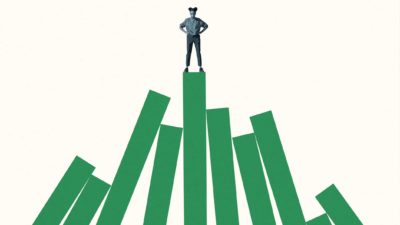With the S&P/ASX 200 Index (ASX: XJO) still down 13% from its 20 February all-time highs, index tracking exchange-traded funds (ETFs) have lost some of their allure.
Of course, the ASX 200 has come roaring back following the savage COVID-driven market selloff earlier this year. Taken together, the average share price of the top 200 ASX companies is up 37% since the 23 March lows.
But as you'd expect, some of those shares have gained far more than 37% while others have lagged behind the broad rebound.
With investors eager for any edge they can get, it's important to keep an eye on wider market trends. Ones that can impact share prices in ways not related to a company's current or forecast profitability.
Which brings us to these 3 letters of ever-growing importance.
Profit, people, and the planet
No, the 3 letters aren't PPP. That's 1 letter repeated 3 times!
The 3 letters many ASX investors ignore to their own potential detriment are:
E – Environmental.
S – Social.
G – Governance.
You may also have heard of ESG policies referred to as the triple bottom line. The idea is that management focuses not only on profits, but also on people and the planet.
Now, ESG investing is far from new.
When I was covering commercial real estate markets in Europe back in 2007, the major shopping centre developers were all eager to demonstrate their commitment to the planet. They were planting trees, installing bike racks, recycling wastewater, and lining their roofs with solar panels.
Some of their actions made real impacts. Others simply helped polish their brand's image. But all their ESG actions likely served to make them more appealing to a wider range of investors.
If you're a true impact investor, you'll want to see the companies follow through and deliver real world results. But even if the companies are just perceived to be doing the right thing, their share prices could benefit.
The rise and rise of ESG
As I said, ESG investing is nothing new. Certainly, it even predates my 2007 immersion into commercial real estate. But with the ascent of social media and the 24/7 news cycle, investors are finding it ever harder to turn a blind eye to a company's policies on its triple bottom line.
According to the Responsible Investment Association Australasia (RIAA), responsible investments in Australia have grown from $980 billion in 2018 to $1.15 trillion today.
And RIAA's research indicates that pace of growth is only likely to speed up, with Australian investors wanting to increase the amount of ESG investments they hold by more than fivefold.
While some ESG policies are initially costly to implement, Simon O'Connor, Chief Executive Officer of RIAA says the impact on share prices should be positive:
The rapid growth in responsible investment has been driven by client demand and strong investment outcomes, with clear evidence that responsible investments deliver stronger risk-adjusted returns.
Some ASX shares have an easier time embracing ESG policies than others. With investors increasingly concerned about carbon emissions, ASX miners are coming under the spotlight.
ASX mining shares in the ESG spotlight
ASX 200 mining giant BHP Group Ltd (ASX: BHP) would have been an unlikely flag-bearer for the ESG movement a few years ago. But today, CEO Mike Henry appears determined to place his company at the forefront of policies that include people and the planet right up there with profits.
Speaking in London on Friday, Henry said (quoted by the Australian Financial Review):
The onus is on them [investors] to make fully informed choices based on a rigorous assessment of ESG performance, consistently applied on a company-by-company basis.
Those companies that consistently operate to the highest standards and are in tune with expectations of society, they should be a core holding of any ESG portfolio. Companies that get this right, who operate and relate to others in the right way, will generate outstanding value and returns for shareholders.
They will be better positioned to sense and manage risk, operate more reliably, access more opportunities and grow more steadily. The role that investors can play is to even more strongly reward these companies, the leaders, by prioritising investment towards them over others. By making them a must-hold part of their portfolio.
They need to reinforce these trends through increasingly differentiating between leaders and laggards in this regard.
It's hard to say just how much the BHP share price has been affected by its progressive ESG policies relative to the price of the commodities it digs up and sells.
But certainly, as the influence of impact investors grows, we can expect to see them hold more sway over ASX share prices, like BHP's.









